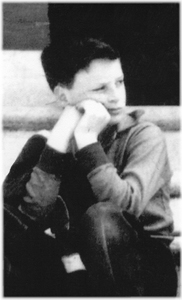

Businessman, CEO of J.Crew
(1944– )
In third grade, I was given a punishment that involved math calculations. Five digits multiplied by four digits. And the punishment was to do thirty or forty of these different multiplications. It’s hard, right? But I did them. The next time I figured out that the teacher didn’t check out the answers, so I just made up the numbers and handed them in. She never checked, but after that I didn’t misbehave. I didn’t like being punished. In the fifth or sixth grade, after the regular public-school day, I also went to Yiddish school. I went for a few years, but then was kicked out for misbehaving. I misbehaved because I always had trouble with authority to a degree. Especially with people who weren’t nice to me. Even to this day, I’m very sensitive to people being rude.
When I was punished in Yiddish school, my teacher, Mr. Schneid, said, “Mordecai”—my Yiddish or maybe my Hebrew name—“you will go home and write, ‘I will be good in shul. Ikh vel zayn gut in shul.’” Maybe it started with my writing this twenty-five times. I misbehaved the next time. “Ikh vel zayn gut in shul.” Fifty times. I got more angry. I couldn’t stand these stupid punishments. I was sitting in the apartment of my aunt Frances, who was a bit of a renegade. With her encouragement I wrote, “Ikh vel zayn gut in shul x 1000.” I handed it in, and that was it. I was out. I was bored out of my mind when I was there. And I think also, somewhere in my eleven- or twelve-year-old head, was the fact that I couldn’t stand the guy.
You know what’s interesting? I didn’t grow up in a home environment that said, Do your work. Be successful. Work hard. That was the usual Jewish DNA message in those days, but not in my family. I was the only one of eight cousins who made it to college. Somehow or other I was lucky. I realized that I needed others as role models. My seventh-grade math teacher was someone I loved. I was always good in math. I excelled in it. Mr. Barrett gave me the confidence to feel good about myself. At home, my mother was either ill or depressed, and my father didn’t pay any attention to me. Ambition and education were not values in my family. I never heard, for instance, Be a doctor. Be a lawyer. Be a dentist or a businessman, for that matter.
There were two things that introduced another world to me, other than the one I knew at home and in the neighborhood. The first one was going to sleepaway camp. For the first time in my life, I met kids who lived on Long Island, Westchester, and even Manhattan. And I’m thinking on visiting day fancy cars are here. I’m looking, and even a kid knows that if you had a Cadillac you were automatically rich. Wow! And then I met this girl who went to a private school in Manhattan. Dalton. I couldn’t imagine going to Dalton, a private school on the Upper East Side. I had never met anyone like that before. I got a tour of the school. I’m looking around and saying, This is another world. Private school. You pay. And it’s in Manhattan. Mecca to a kid from the Bronx.
The second introduction to the world at large was when I went to Bronx High School of Science. One of my best friends there was Jack Friedman, who lived in Riverdale. A three-bedroom apartment, a housekeeper, and a father who was a stockbroker. I couldn’t get over the wealth. I had never seen this before. A maid, a remote control on the TV—his father had the remote—and three bedrooms.
It was lucky that I went to Science, because everyone there was expected to go on to college. I didn’t get that from my home, as I’ve said. If you were affluent, then you could afford to go to a private school. At home, there wasn’t even a discussion about which college to go to. When it came up, it was automatic. City College or State University.
There was a hunger that I had growing up in the Bronx. It wasn’t financial. It was an emotional hunger. I was lucky that I had aunts in the neighborhood who balanced out what I didn’t get at home. But I had this added hunger to go out into the world. It was an achievement hunger. It was a pass to get out and the training was the Bronx.
When I worked in San Francisco, I was out of my natural habitat for eighteen years. There’s something about this town, New York. You feel it. You see it. It has the highest level of intensity, of humor, of creativity. And none of that gets separated from where we grew up.
As you grow older, you can grow in any environment because you have exposure and the possibilities of learning every day. And I’m still learning. The way I grew up turned out to be the best thing that ever happened to me.